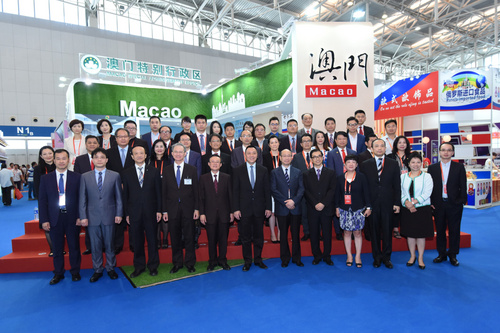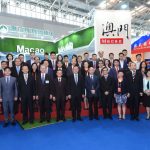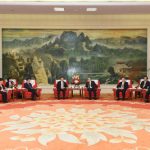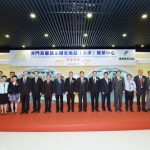 The Secretary for Economy and Finance, Mr Leong Vai Tac, and head of the Government delegation, Mr Kou Chin Hung, pose for a group photograph in front of the Macao pavilion at the Conference on Overseas Chinese Pioneering and Developing in China and the Chinese Project and Commodity Expo of World Overseas Chinese Entrepreneurs 2017, held in Tianjin.
The Secretary for Economy and Finance, Mr Leong Vai Tac, and head of the Government delegation, Mr Kou Chin Hung, pose for a group photograph in front of the Macao pavilion at the Conference on Overseas Chinese Pioneering and Developing in China and the Chinese Project and Commodity Expo of World Overseas Chinese Entrepreneurs 2017, held in Tianjin.
Cooperation with Tianjin Municipality and its platform role would help Macao advance its own strategic position as a platform connecting China and Portuguese-speaking countries, said today the Secretary for Economy and Finance, Mr Leong Vai Tac.
Mr Leong was speaking in Tianjin during a meeting with the Secretary of Tianjin Municipal Committee of the Communist Party of China, Mr Li Hongzhong, and the Mayor of Tianjin Municipality, Mr Wang Dongfeng.
Strengthening people-to-people ties was an important element in furthering financial integration and enhancing trade under the country’s “Belt and Road” initiative. Bolstering such connections was also a way for Macao – with its strong links to networks of overseas Chinese – to make further contributions to the “Belt and Road” initiative, added Mr Leong.
The Secretary was in Tianjin to attend the opening ceremony of the “Conference on Overseas Chinese Pioneering and Developing in China and the Chinese Project and Commodity Expo of World Overseas Chinese Entrepreneurs 2017”.
A Government-organised delegation – including representatives from Macao’s overseas Chinese community and from the city’s industrial and commercial sectors – is attending the Conference. The delegation arrived in Tianjin after attending the “Second Global Overseas Chinese Industry and Commerce Convention”, held in Beijing.
The Conference in Tianjin and the “Second Global Overseas Chinese Industry and Commerce Convention” held in Beijing are respectively events highlighting the role of overseas Chinese around the world.
In the morning, Mr Leong and the delegation attended an opening ceremony for the Tianjin event’s Macao pavilion. In the afternoon, they officiated at the opening ceremony of a Macao display centre for Portuguese-speaking countries’ products, organised by the Macau Importers & Exporters Association.
The Macao pavilion is designed to showcase the current investment environment in Macao, particularly in relation to opportunities created by the “Centre and Platform” policies; the development of traditional Chinese medicine; and how the city’s overseas Chinese community can take part in the Government’s economic diversification effort and make contributions to the “Belt and Road” initiative.
The “Centre and Platform” policies refer to Macao’s strategic positions as a world centre of tourism and leisure and as a commercial and trade cooperation service platform between China and Portuguese-speaking countries.
The head of the delegation and Adviser to the Chief Executive’s Office, Mr Kou Chin Hung, told reporters in Tianjin that state leaders and the Overseas Chinese Affairs Office of the State Council highly appreciated the achievements of Macao’s overseas Chinese community, and had directed the Government of the Macao Special Administrative Region to give full support to the community’s work.
The Government would spare no effort in its policy of encouraging Macao’s overseas Chinese community to play a major role in the “Belt and Road” initiative. He also noted Macao would press ahead with its proposals for involvement in the plan for a city cluster in the Guangdong-Hong Kong-Macao Greater Bay Area.
The Government would additionally step up its efforts regarding promotion of the country’s proposed Silk Road Economic Belt and the 21st-Century Maritime Silk Road (collectively known as the “Belt and Road” initiative) in, respectively, Southeast Asia, Portuguese-speaking countries and the European Union, added Mr Kou.
View gallery




